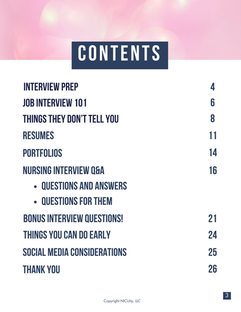12 Example Nurse Interview Questions
- Jan 10, 2025
- 6 min read
Updated: May 12, 2025
I’m often asked on Instagram: "How do I prepare for a NICU interview?" The answer might be easier than you think.

The scary part about interviews is that if you’ve never worked in a NICU before, you probably aren’t very familiar with the workflow. This can be daunting and can leave you feeling underprepared and underqualified.
However, hiring managers for these departments know this, and tend not to ask many questions that only experienced NICU nurses would know the answers to. Rather, they want to know why you want to work in their unit and how you’ve prepared to be successful in the role. They ask situational questions, like how you handled a challenging family member or how you responded during an emergency. They’ll be looking to hire someone who’s a great fit for their team, not just someone who has loads of NICU bedside experience.

Most interviewers have a short list of skills they’ll be looking for in a nurse:
Will they jump in and help a patient or coworker?
Are they open to learning and growing?
Can they stay calm and handle high-pressure situations?
Do they have the confidence to speak up and advocate for a patient’s needs?
Do they know how to prioritize and delegate?
Are they equipped to support and comfort an infant and their family members?
Are they interested in leadership roles?
It’s important to remember that nurse interviewers don’t reinvent the wheel each time. They usually have a repository of questions to ask, many of which are similar to questions you’ve been asked in previous interviews. Let’s review a few common questions to give you a sense of what hiring managers will ask.
12 Common Nurse Interview Questions
1. “Tell me a bit about yourself.”
Most hiring managers will start with a basic introductory question like this one. You’ll want to share a bit about your personal and professional background, your education, and your career goals. This is your time to share your excitement and enthusiasm for the NICU.
2. “What made you interested in our unit?”

When answering this question, you’ll want to highlight any relevant nursing experience that has prepared you for the role. Maybe the unit you're interviewing for has won an award for its healthy work environment or is known for its high quality teamwork. Be sure to reference what you’re looking for in a nursing job and share why you think this particular unit is a good fit for you.
3. “How do you plan to help us meet our organizational goals?”
Here, your interview will be checking to see if you’ve done your homework on their facility. Each unit has its own set of unique clinical goals. Prepare for your interview by conducting background research on the institution. You can check out their nursing website, read up on patient feedback and reviews, and talk to friends who work there.
During the interview, you’ll want to show them that you’re familiar with NICU nursing quality indicators like infection rates and pressure injuries and know what it takes to keep patients safe.

4. “Tell me about a time when you made a mistake. How did you handle the situation?”
Mistakes happen in nursing everyday. What’s important is that you learn from your mistake and work to minimize patient harm. When answering this question, you’ll want to be honest and open about a mistake you’ve made. Interviewers can smell a fake answer like “I’ve never made a mistake” from a mile away.
5. “What strengths will you bring to our nursing team?”
Managers who ask this question want to know what you’ll bring to the table. Share behaviors and skills like time management, strong communication, compassion, and attention to detail. Telling a story about your strengths in action can give more meaning to your experiences and bedside expertise.
6. “How would you handle a patient emergency?”
Answers to this question can reveal whether you have the skills and experience to handle a patient who is decompromising fast. Show that you know how to communicate concerns to the physician and step in when things get hectic.

7. “Describe a time when you went above and beyond for a family member.”
Patient and family advocacy is so important to improving health outcomes. Managers want to make sure they hire nurses that go the extra mile to get patients the care and treatment they need.
8. “Have you ever had a conflict with a coworker? How did you handle the situation?”

Unfortunately, disagreements arise in healthcare. What’s most important is that you can handle yourself professionally and manage the situation in a calm and composed manner. Show that you prioritize patient safety and satisfaction over your own personal pride. Managers won’t want to hire someone that’s petty or argumentative.
9. “How would you communicate with a family member who was unhappy with the team’s care plan?”
Sometimes, a parent or family member is unhappy with the quality of care their loved one receives. It’s often our duty as nurses to listen to their complaints and work to resolve their concerns as quickly and painlessly as possible.

10. “How do you plan to de-stress after a challenging shift?”
Nursing can be challenging and it’s important to demonstrate you have the skills necessary to bounce back after a tough shift. Can you compartmentalize and complete the tasks that need to be done? Will you have the strength to come back day after day? Answers to this question can showcase your resilience and dedication to patient care.
11. “What are your professional goals for the next 5 years?”
Hiring managers want to know if you’re driven and motivated to improve your professional practice. Do you plan to work in their organization long-term or if you are on the fast track to an advanced degree? Interviewers care less about what your goals actually are and just care that you’re thinking about your future in nursing.
12. “Do you have any questions for us before we finish up?”
An interview allows you to ask clarifying questions about the logistics of the position. If you don’t ask any questions, the hiring manager may assume you’re not that interested in the position. Here, we provide a list of example questions you can ask during the final minutes of your interview:
LIST OF QUESTIONS TO CONSIDER:
1. What is the size and organizational structure of your unit? How many patients does your unit hold?
2. What is your nurse-to-patient ratio?
3. Can you discuss your take on the hospital's culture and philosophy?
4. What does the transition period look like? Would I be expected to work days or nights?
5. What does the orientation period look like? Will I have a designated preceptor?
6. What are some recommendations for getting involved and growing within your unit?
7. What will be the greatest challenge of the job?
8. What are the greatest strengths of this department?
9. Can you describe a typical day for someone in this position?
10. What are the traits and skills of people most successful within this unit?
11. What do you like best about working in this organization?

Download your Interview E-Book today! The Complete Nurse Interview E-Book
Here is our fully loaded E-Book. This E-Book is a digital download that provides you with NURSE PRO TIPS to help you land that dream job! This is a fully loaded guide complete with the strategies to help you master your job application and interview process. We cover all of the juicy details to help you perfect the art of interviewing.
Topics included:
♡ INTERVIEW PREP
♡ JOB INTERVIEW 101
♡ THE THINGS THEY DON’T TELL YOU
♡ NURSING INTERVIEW QUESTIONS AND RESPONSES
♡ BONUS INTERVIEW QUESTIONS!
♡ PORTFOLIO BREAKDOWN
♡ RESUME AND COVER LETTER 101
♡ THINGS YOU CAN DO EARLY
♡ SOCIAL MEDIA CONSIDERATIONS
Tips for Every Stage of Your Nursing Journey
Whether you're interviewing for a position or are looking to develop your professional practice in your current role, NICUity has you covered! We’ve got educational resources, guides, and supplies to get you through every step of the way.

Tori Meskin, MSN, RNC-NIC, has been a passionate NICU clinician since 2012, specializing in acute care and inpatient neonatal settings throughout Southern California. Board-certified in neonatal intensive care, she also brings extensive experience as a travel NICU nurse. Tori is the co-founder of NICUity, a modern resource hub empowering NICU professionals with hands-on tools, education, and community support. As a mother, wife, and entrepreneur, she shares her journey balancing life at the bedside with motherhood, marriage, content creation, and building a brand. Discover her latest tips, tools, and insights at www.tipsfromtori.com or reach out at abbysocialmgmt@gmail.com.







